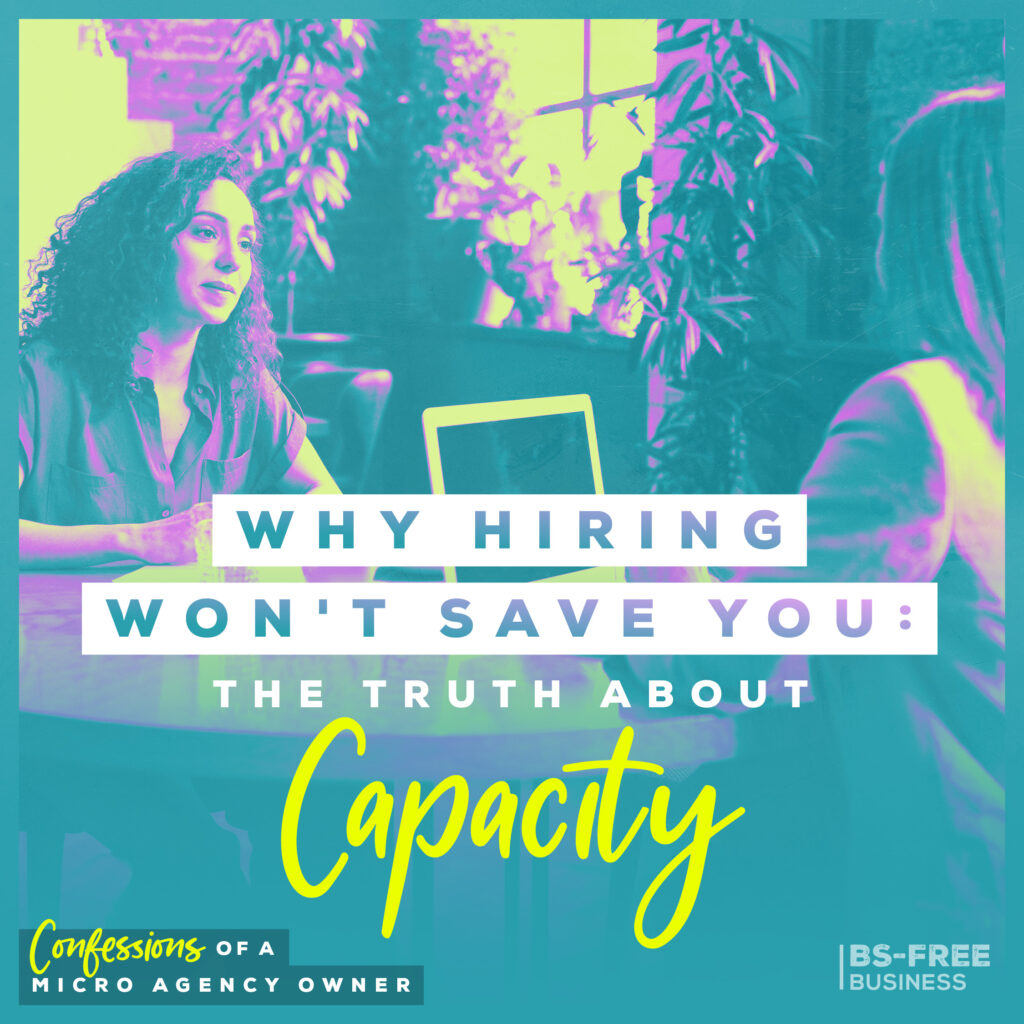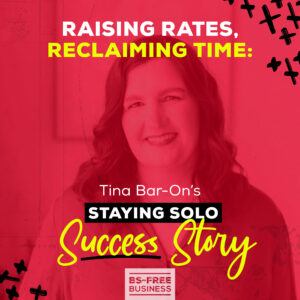
Search the site:
Why Hiring Won’t Save You: The Truth About Capacity
You and your team are maxed out, juggling too much, and the work keeps coming. The natural inclination is to hire so you can share the workload.
But here’s the hard truth: hiring isn’t the quick fix it’s made out to be. It can add more chaos to an already overwhelmed team.
In today’s episode, we’re cutting through the BS about hiring as a capacity solution. I’ll show you why adding more people is only sometimes the answer and share some ideas for what to consider before you hire.
I’ve been itching to discuss this topic because it always comes up with micro agency owners, especially when you and your team are at capacity and drowning in work.
So, here’s the scenario: You’ve got more work than you can handle, clients are demanding more, and you’re juggling way too much.
What’s the first piece of advice you hear? “Just hire someone!”
I’m here to tell you that hiring won’t save you. And, in some cases, it’ll do more harm than good.
One of the biggest myths we’ve been sold as micro agency owners is that hiring is the quick fix to solving our capacity problems. I’ll explain why that’s a dangerous assumption and give you some real alternatives to consider before you go down the hiring rabbit hole.
The “More People, More Time” Myth
Let’s start with this standard narrative we hear repeatedly: You’re overwhelmed, and the solution is to hire someone to take the workload off your plate.
The idea is that if you have more people, you can get more done. And in some ways, this is true.
Theoretically, if you hire skilled people, you can divide and conquer. But here’s the thing: This advice often skips over the work of hiring and managing a team.
Think about this. Have you ever hired someone—whether a contractor, part-time help, or even full-time—and then realized that bringing them on didn’t free you up?
Suddenly, instead of focusing on client work, you spend hours onboarding, training, answering questions, and fixing mistakes. And let’s not even get into the emotional drain of managing people—especially if they’re not performing as you expected.
That’s the problem with this quick-fix mindset about hiring. It doesn’t take into account the actual costs.
When you’re a micro agency, hiring isn’t a plug-and-play solution. You don’t have an HR department or layers of management between you and your team. You’re often the manager, the HR rep, and the owner all in one—and that’s a lot.
So, while hiring might sound like the solution, it’s often just the beginning of a new set of capacity problems.
The Hidden Costs of Hiring
You know it’s more complex than “I need help, let’s hire, and boom! Problem solved.”
It’s more like we need help. Let me post a job, sift through resumes, schedule interviews, conduct the interviews, onboard the person, and then—oh wait—they need to be trained on how your agency operates, your clients, and so much more.
When you hire a new person in a bigger business or agency, onboarding takes a few weeks. Then, there’s a team to support them and ensure their performance.
With a micro agency, you have a small team by design. You’re hiring someone because your team is stretched thin, but now you’ve added another layer of responsibility.
Plus, it’s one thing to hire, but it’s another to trust someone to do the work. You’ve probably been in a situation where you feel it’s more hand-holding than it’s worth.
That’s one of the reasons I’m not interested in growing my agency further. It will require adding to our team, which I don’t want right now. When capacity issues set in, I need to decide whether to pass on potential client work or get creative with how we do it.
You’ll likely lose time for the first three to six months after hiring someone. Hiring isn’t a band-aid; it needs to be a strategic business decision, as the upfront cost in time and energy is massive.
The Financial Reality of Hiring
Hiring costs money. And I’m not just talking about salaries or hourly rates.
When you hire, all these other expenses start to creep in:
- Software licenses.
- Benefits if you’re hiring full-time.
- Additional tools to help them work efficiently.
Suddenly, it’s not just about paying someone—it’s about investing in an infrastructure to support them. And what happens if business slows down or you hit a slow season? You’re still on the hook for those costs.
Let’s get even more granular. Hiring someone means you must factor in “time loss” for you and the new hire to get up to speed. That’s time you’re not billing, that’s time the new hire isn’t producing at 100%, and that’s time when you’re dealing with inefficiencies in the transition.
When you’re a micro agency, cash flow is everything. If you’re not careful, you can easily spend more than you’re bringing in, all in the name of solving a capacity problem that could’ve been dealt with in other ways.
That’s not to say you shouldn’t hire; you can’t just keep throwing money at your capacity challenges.
What to Consider Instead
Now that we’ve discussed why hiring isn’t the magic bullet for solving your capacity issues, let’s explore what you can do instead. I’m excited about this part because there are many ways to solve capacity problems without adding people and all the complexities that come with that.
Refine Your Processes
The first thing I look at before considering hiring is my processes. Are they as streamlined as they could be? Can things be automated or systematized?
Often, our teams spend way more time on tasks than they need to due to a need for process refinement. A lack of skill, understanding or clarity leads to wasted time and effort, ultimately eating into your margins.
You’d be surprised how much time you can save just by tightening up how you work. It’s not sexy, but it’s effective.
Re-evaluate Your Services
Another big area to look at is what you’re offering. If you’re doing a lot of custom work, you’ll naturally run into capacity issues faster than if you have more repeatable, scalable services.
Ask yourself: Can I simplify my offerings? Can I package my services in a way that requires less customization and less time spent on each client?
Sometimes, the real solution to your capacity problem isn’t more hands—it’s a better strategy. Focus on the work that brings in the most value with the least time investment.
Raise Your Prices
Sometimes, the answer to capacity issues is to charge more. Raising your rates is one of the most straightforward fixes if you’re drowning in work.
You’ll have fewer clients, but the ones you do have will be paying more. That gives you more room to breathe and potentially more profit without adding extra people.
Evaluate Your Bottlenecks
Now, here’s a tough one that many of us don’t like to face:
Sometimes, you’re the bottleneck in your business. Maybe you’re holding on to tasks that could easily be automated or delegated, or you’re overcomplicating things because you think no one else can do it as well as you can.
Before hiring more people, look hard at where you’re slowing things down. Are there tasks you’re doing out of habit that could be handed off to an assistant or handled by software? Or maybe you need to let go of control in certain areas.
When Hiring Makes Sense
I know this episode has been pretty anti-hiring so far, but I’m not saying that hiring is never the answer.
There are absolutely times when bringing someone on makes sense—when you’ve reached a point where you’ve streamlined your processes, refined your services, and done everything you can.
Hiring is the next logical step if you’ve done all that and need more help.
Here’s when it makes sense to hire:
- You have consistent revenue that can cover the costs of the new hire.
- You’ve maxed out your efficiency and still need more hands.
- You’re ready (or need to) step into more of a leadership and management role and need to get things off your plate.
But even then, hiring should be done with a clear understanding of the time and energy it will require from you. It’s not a quick fix!
The Bigger Picture: It’s Not Just About Capacity
Here’s the thing—capacity isn’t just about time or the number of people on your team. It’s about your emotional, mental, and even financial capacity.
If hiring will drain you more than it helps, it may not be worth it.
I often ask my micro agency clients, “What do you want?”. They usually have opportunities to sign more clients, but it will require them to hire, and they’re already feeling stretched.
They don’t necessarily want to hire but should take advantage of potential new clients.
Part of being a micro agency is having the ability to choose how big (or small) your team is. Just because there’s demand for your services doesn’t mean you have to grow continuously.
Capacity challenges are very real, and they’re always layered and nuanced. Beyond hiring, there are many ways to tackle them, so take a step back and look at the big picture of your offerings, processes, operations, and pricing. You may see other opportunities that don’t always require adding employees or contractors.

I’m Maggie Patterson (she/her), and services businesses are my business.
I have 20+ years of experience with client services, am a consultant for agency owners, creatives, and consultants, and vocal advocate for humane business practices rooted in empathy, respect, and trust.
For Solo Business Owners

Growing a solo service business is tough.
It’s even harder when you’re bombarded with BS advice that steers you away from your values and why you started your business in the first place.
This is the podcast for solo creatives and consultants who want to remain as a team of one and have zero interest in the hustle and grind of typical business teachings.
Subscribe now and never miss an episode.
For Micro Agency Owners
Most podcasts for agency owners obsess over revenue growth as the ultimate success metric.

But here’s the truth: not everyone wants to make millions. Your goal might be to build a sustainable business that lets you have a life and doesn’t run you into the ground.
Join me as I spill my shameless confessions and share everything I’ve learned about building a micro agency that skips the BS of tired and typical agency teachings.
Follow Now on All Major Podcast Platforms







